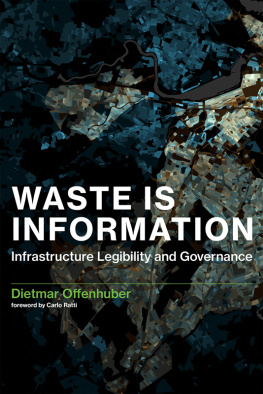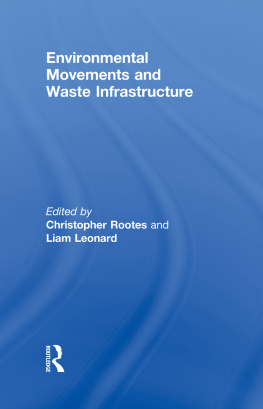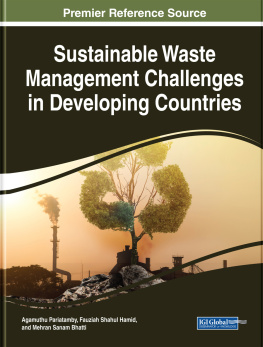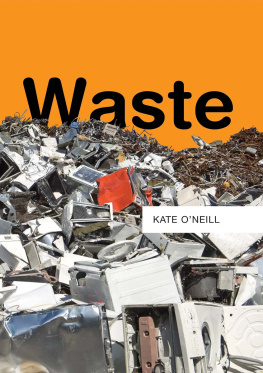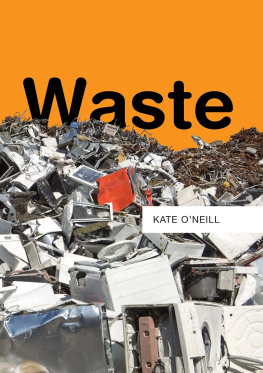
Infrastructures Series
edited by Geoffrey C. Bowker and Paul N. Edwards
Paul N. Edwards, A Vast Machine: Computer Models, Climate Data, and the Politics of Global Warming
Lawrence M. Busch, Standards: Recipes for Reality
Lisa Gitelman, ed., Raw Data Is an Oxymoron
Finn Brunton, Spam: A Shadow History of the Internet
Nil Disco and Eda Kranakis, eds., Cosmopolitan Commons: Sharing Resources and Risks across Borders
Casper Bruun Jensen and Brit Ross Winthereik, Monitoring Movements in Development Aid: Recursive Partnerships and Infrastructures
James Leach and Lee Wilson, eds., Subversion, Conversion, Development: Cross-Cultural Knowledge Exchange and the Politics of Design
Olga Kuchinskaya, The Politics of Invisibility: Public Knowledge about Radiation Health Effects after Chernobyl
Ashley Carse, Beyond the Big Ditch: Politics, Ecology, and Infrastructure at the Panama Canal
Alexander Klose, translated by Charles Marcrum II, The Container Principle: How a Box Changes the Way We Think
Eric T. Meyer and Ralph Schroeder, Knowledge Machines: Digital Transformations of the Sciences and Humanities
Geoffrey C. Bowker, Stefan Timmermans, Adele E. Clarke, and Ellen Balka, eds., Boundary Objects and Beyond: Working with Leigh Star
Clifford Siskin, System: The Shape of Knowledge from the Enlightenment
Lawrence Busch, Knowledge for Sale: The Neoliberal Takeover of Higher Education
Bill Maurer and Lana Swartz, eds., Paid: Tales of Dongles, Checks, and Other Money Stuff
Dietmar Offenhuber, Waste Is Information: Infrastructure Legibility and Governance
Waste Is Information
Infrastructure Legibility and Governance
Dietmar Offenhuber
foreword by Carlo Ratti
The MIT Press
Cambridge, Massachusetts
London, England
2017 Massachusetts Institute of Technology
All rights reserved. No part of this book may be reproduced in any form by any electronic or mechanical means (including photocopying, recording, or information storage and retrieval) without permission in writing from the publisher.
This book was set in ITC Stone Sans Std and ITC Stone Serif Std by Toppan Best-set Premedia Limited. Printed and bound in the United States of America.
Library of Congress Cataloging-in-Publication Data
Names: Offenhuber, Dietmar, author.
Title: Waste is information : infrastructure legibility and governance / Dietmar Offenhuber ; foreword by Carlo Ratti.
Description: Cambridge, MA : MIT Press, [2017] | Series: Infrastructures |
Includes bibliographical references and index.
Identifiers: LCCN 2017000879 | ISBN 9780262036733 (hardcover : alk. paper)
eISBN 9780262342209
Subjects: LCSH: Refuse and refuse disposal--Planning. | Refuse and refuse
disposal--Citizen participation. | Municipal services--Planning--Case
studies. | Refuse and refuse disposal--Philosophy. | City planning.
Classification: LCC TD793 .O45 2017 | DDC 363.72/8--dc23 LC record available at https://lccn.loc.gov/2017000879
ePub Version 1.0
Foreword
CarloRatti
What will the human race be at the moment of its extinction? A certain quantity of information about itself and the world, a finite quantity, given that it will no longer be able to propagate itself and grow.
Italo Calvino, World Memory and Other Cosmicomic Stories, 1968
A little-known short story by Italian writer Italo Calvino, called World Memory, imagines a future human condition when all information produced by humanity will be stored and available for search. In other terms, it will be an archive that will bring together and catalogue everything that is known about every person, animal and thing, by way of a general inventory not only of the present but of the past too, of everything that has ever been since time began, in short a general and simultaneous history of everything, or rather a catalogue of everything, moment by moment.
Calvinos fictional condition could not be more topical today, as the amount of digital data we generate and store on the planet is growing at an unprecedented rate. It is sometimes estimated that up to 90 percent of all of the information available in the world today was produced in the past two years (2015 and 2016) alone. Most of our actionsthe calls we make, the apps we use, the credit cards we scanare recorded and added to a growing digital repository of human life. Our deliberate actions also contribute toward this ever-growing Big Data: when we post a picture, tweet a thought, or share moments of our life with friends and the broader network. To employ a word now commonly adopted in research, our own human self is becoming quantifiable and quantified.
Most of the digital footprints that are recorded today are somehow connected with some measure of human activity. They tend to concentrate in cities (where humans abound ) and record actions that society considers of valuethings that are meaningful to us. In this book, Dietmar Offenhuber takes an unprecedented approach and turns his informational lens upside down. He focuses not on what is meaningful and has value but on what society discards: waste. He uses it as the starting point of a reflection on human life not through its direct observation, but through the proxy of what it constantly excretes.
As archaeologists have often shown, dumps can offer unprecedented snapshots of past civilization. The minutia of life that might be lost in official recordings emerges there with new force. The immediacy of what has been disposed of provides unexpected angles on the processes that produced itand then got rid of it as waste. Also, the examination of what is discarded, and what is not, helps us also understand what was waste and what was not, a definition that changes in different times and different societies. Offenhuber takes this lens to the present day andas a digital archaeologist of the contemporary eraembarks in a multifaceted analysis of Waste as Information.
Implicit in Offenhubers investigation seems to be an agenda of social justice. Waste is just another aspect of societal rejection, as determined by the local conventions of a given time and place. He writes: Waste systems cannot be separated from systems of production, and notions of value cannot be seen in isolation. The value of an object and the value of the human work attached to it cannot be separated. By elevating waste as the focus of this investigation, Offenhuber seems to rehabilitate those circles of society that suffer from the same rejection.
As one reads through the pages of this fascinating book, little by little the line between waste and nonwaste becomes increasingly blurred. This reminds us of an excerpt from Italo Calvinos Invisible Cities (1972), where waste seems to become the organizing principle of the world in the city of Leonia: Leonias rubbish little by little would invade the world, if, from beyond the final crest of its boundless rubbish heap, the street cleaners of other cities were not pressing, also pushing mountains of refuse in front of themselves. Perhaps the whole world, beyond Leonias boundaries, is covered by craters of rubbish, each surrounding a metropolis in constant eruption.
Preface: The Paper Police
All that is necessary already exists it is just wrongly distributed.
Jrgen O. Olbrich, e-mail interview with author, March 3, 2010
For the past twenty years, Kassel-based artist Jrgen O. Olbrich has been scavenging paper and cardboard containers looking for printed materialbooks, manuals, documents, postcards, and reports. Influenced by the Fluxus movements rejection of the separation between art and everyday life, his excursions are informed by the goal of losing nothing worth preserving. He is motivated by how everyday culture and history gets lost because the importance of discarded items has been forgotten.
Next page
